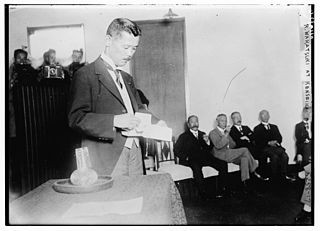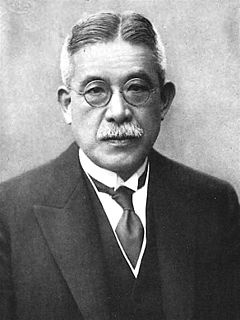
Inukai Tsuyoshi was a Japanese politician, cabinet minister, and Prime Minister of Japan from 1931 to his assassination in 1932.

Taishō era is a period in the history of Japan dating from 30 July 1912 to 25 December 1926, coinciding with the reign of the Emperor Taishō. The new emperor was a sickly man, which prompted the shift in political power from the old oligarchic group of elder statesmen to the Imperial Diet of Japan and the democratic parties. Thus, the era is considered the time of the liberal movement known as the "Taishō democracy" in Japan; it is usually distinguished from the preceding chaotic Meiji period and the following militaristic-driven first part of the Shōwa period.
Japaneses liberalism formed in the nineteenth century as a reaction against traditional society. In the twentieth century 'liberal' gradually became a synonym for conservative, and today the main conservative party in the country is named Liberal Democratic Party. The Democratic Party (Minshuto) was considered in part a left-of-center social-liberal party, as are most parties which derived from it. The liberal character of the Liberal League is disputed, as it is also considered to be conservative by some. Liberals in Japan are generally considered united by one major factor: their opposition to changing the post-World War II constitution forbidding the creation of a national military. This article is limited to liberal parties with substantial support, proved by having had representation in parliament. The sign ⇒ means a reference to another party in that scheme. For inclusion in this scheme it isn't necessary that parties labelled themselves `liberal`.
Political parties appeared in Japan after the Meiji Restoration, and gradually increased in importance after the promulgation of the Meiji Constitution and the creation of the Diet of Japan. During the Taishō period, parliamentary democracy based on party politics temporarily succeeded in Japan, but in the 1930s the political parties were eclipsed by the military, and were dissolved in the 1940s during World War II
General elections were held in Japan on 20 February 1932. They were the last elections before the May 15 Incident, which marked the temporary end of party politics in Japan. Rikken Seiyūkai won 301 of the 466 seats in the House of Representatives.

Rikken Minseitō was one of the main political parties in pre-war Empire of Japan. It was commonly known as the 'Minseitō'.

The Kenseikai was a short-lived political party in the pre-war Empire of Japan.
Constitution Party, Constitutional Party, or Constitutionalist Party may refer to one of several political parties.

Fusanosuke Kuhara was an entrepreneur, politician and cabinet minister in the pre-war Empire of Japan.

Adachi Kenzō was a statesman, politician and cabinet minister in Taishō and early Shōwa period Japan.

Takejirō Tokonami was a Japanese statesman, politician and cabinet minister in Taishō and early Shōwa period Japan. Tokonami was involved in several government agencies throughout his career, and served in the leadership of different political parties. He was regarded by his contemporaries as a rather opportunistic politician eager for an opportunity to become prime minister.

Toshio Shimada was a politician and cabinet minister in the pre-war Empire of Japan.
The Yūkōkai was a political party in Japan. It was active from 1906 until 1908.
The Seiyūhontō was a political party in Japan. It was active from 1924 until 1927.
The Shōwakai was a political party in Japan.
The Boshin Club was a political party in Japan.
The Seiyū Club was a short-lived political party in Japan.
The Chūsei Club was a pro-business political party in Japan.
This page is based on this
Wikipedia article Text is available under the
CC BY-SA 4.0 license; additional terms may apply.
Images, videos and audio are available under their respective licenses.










